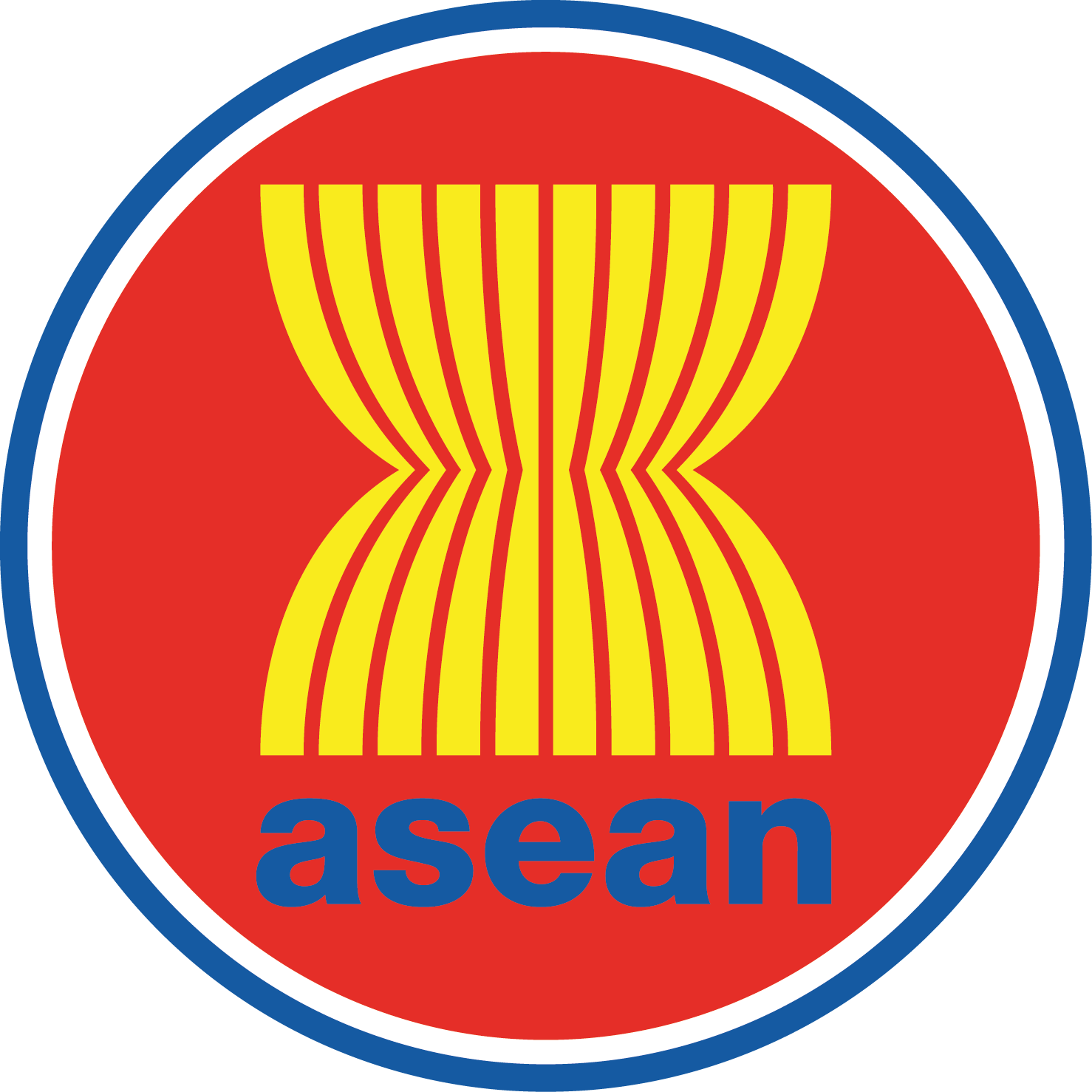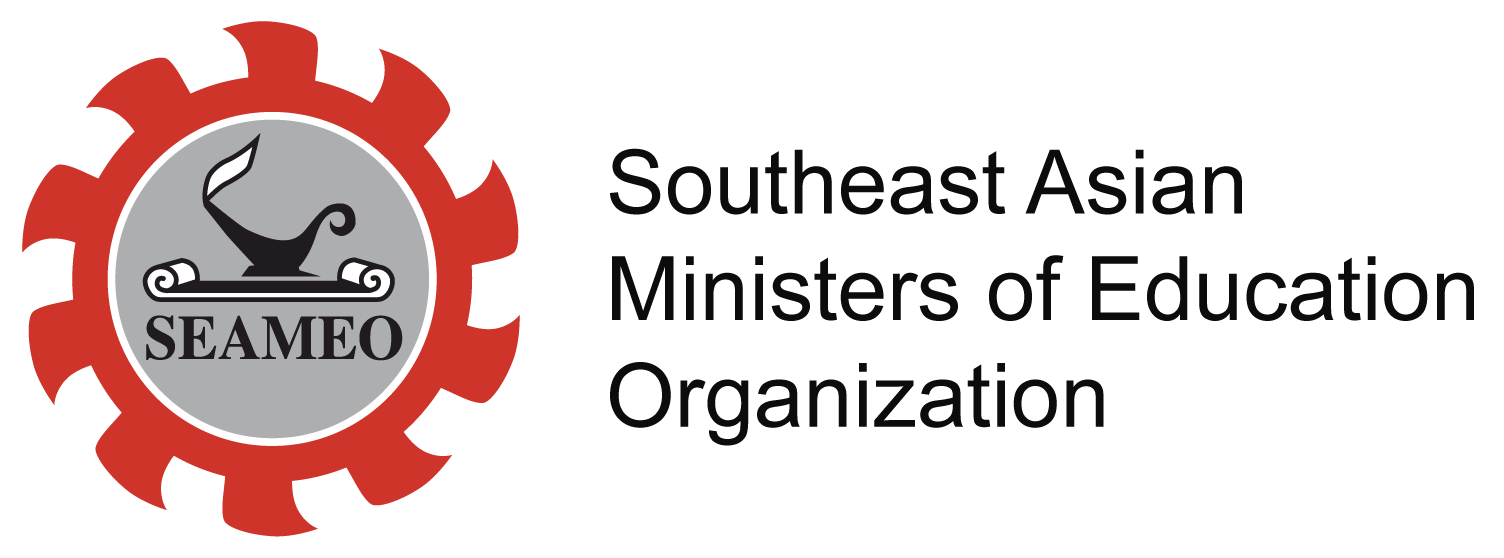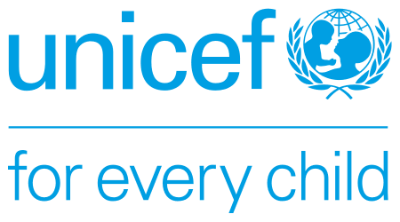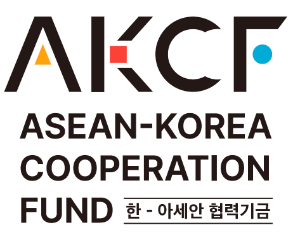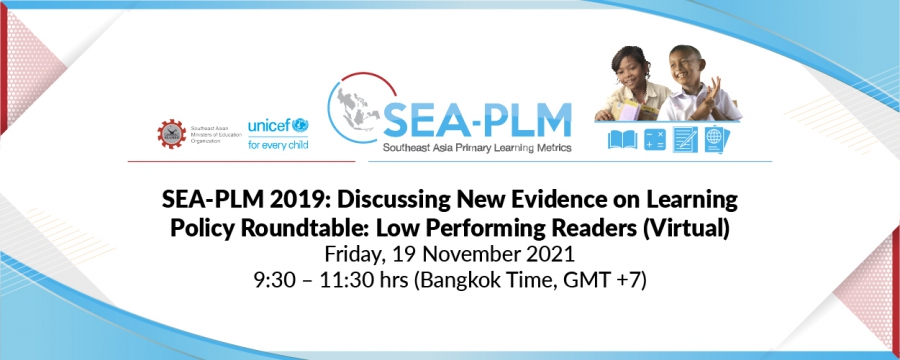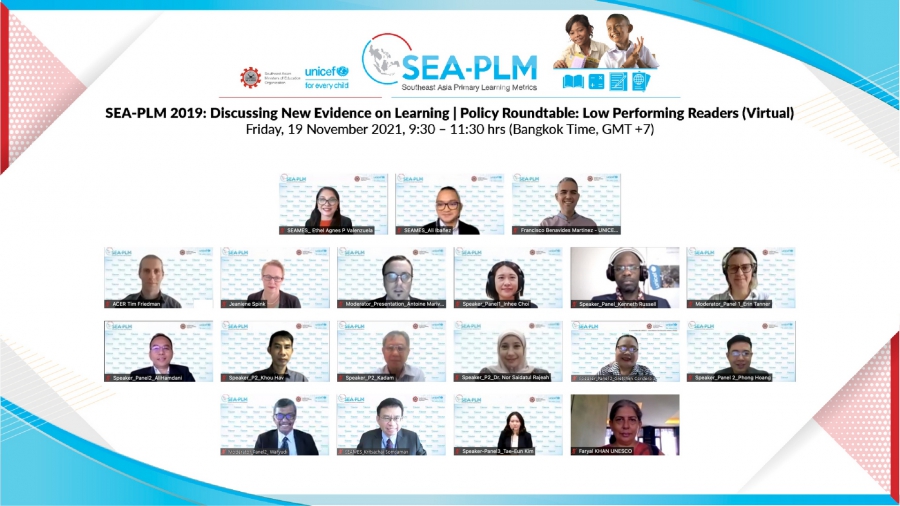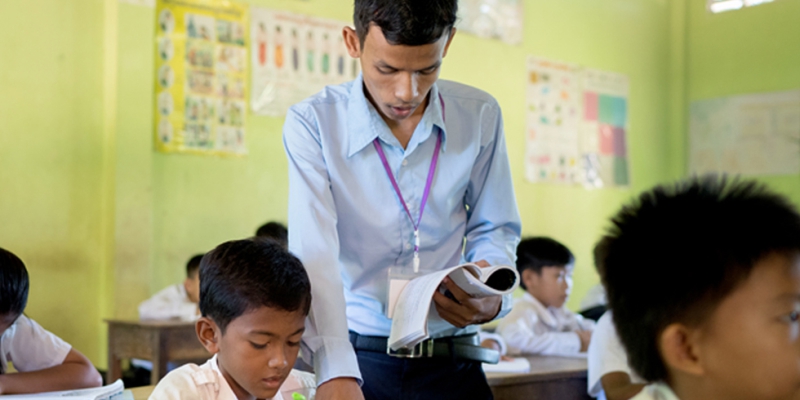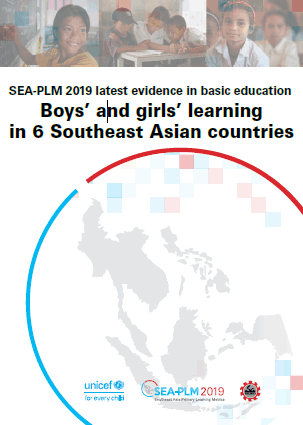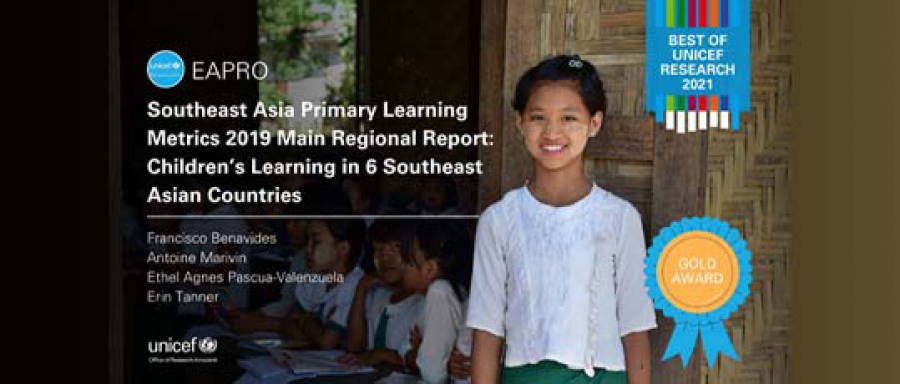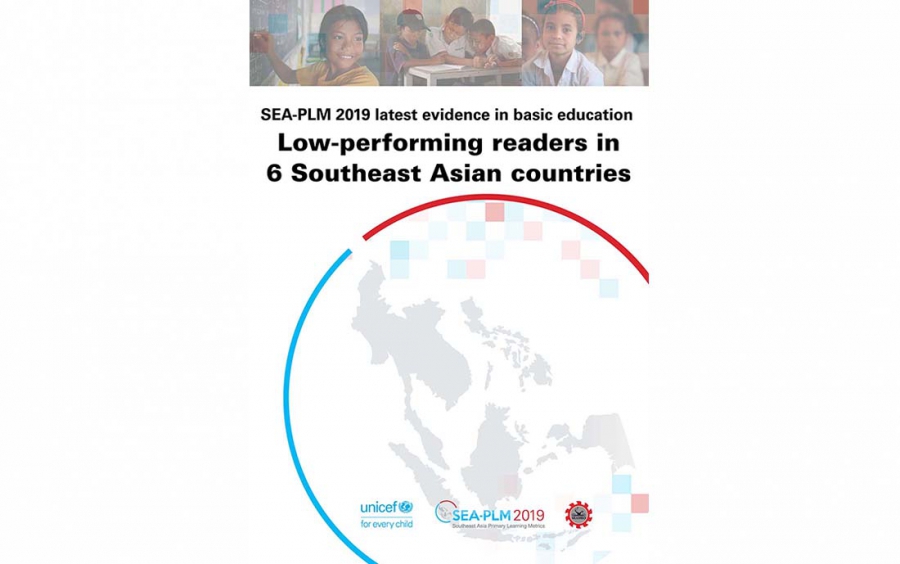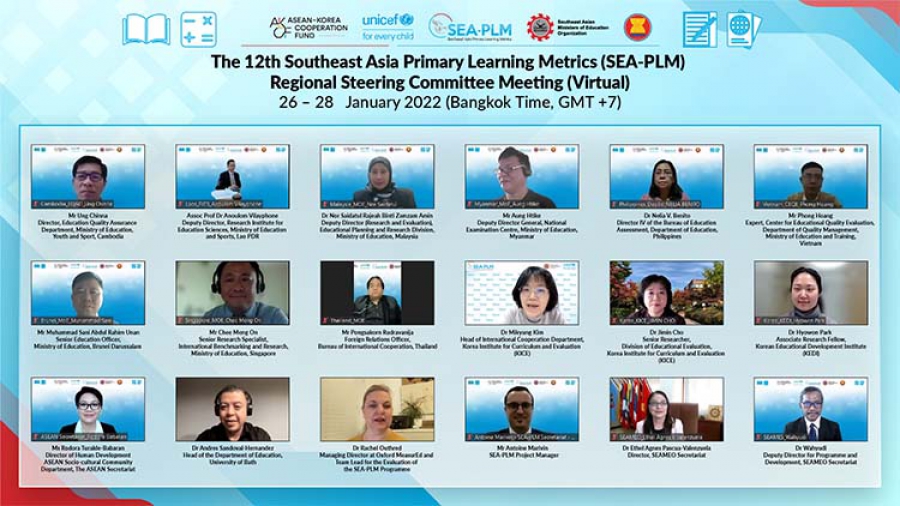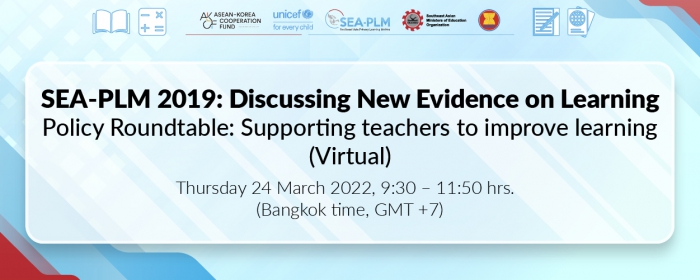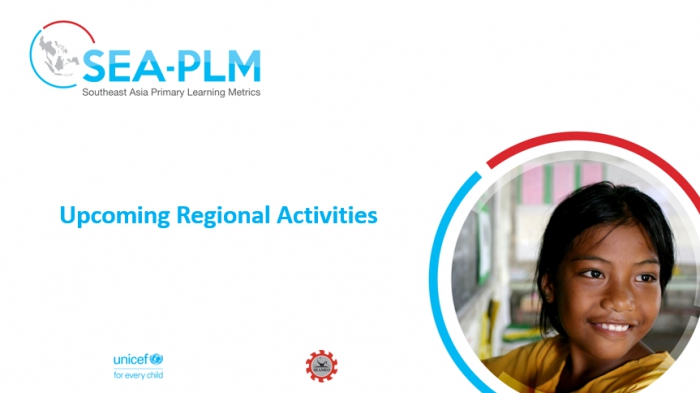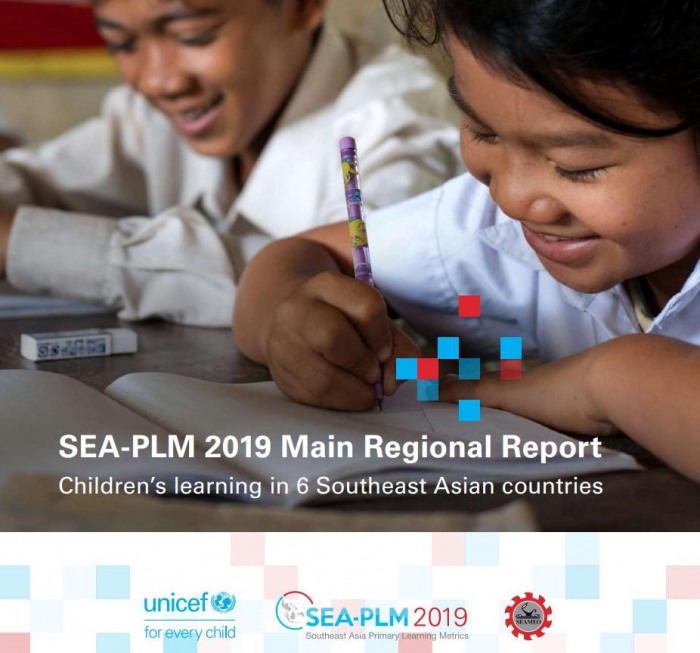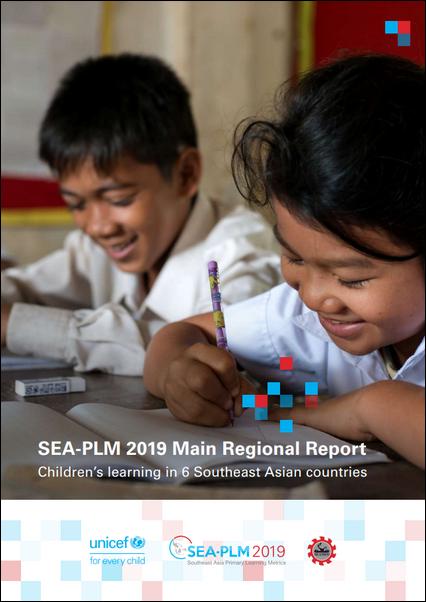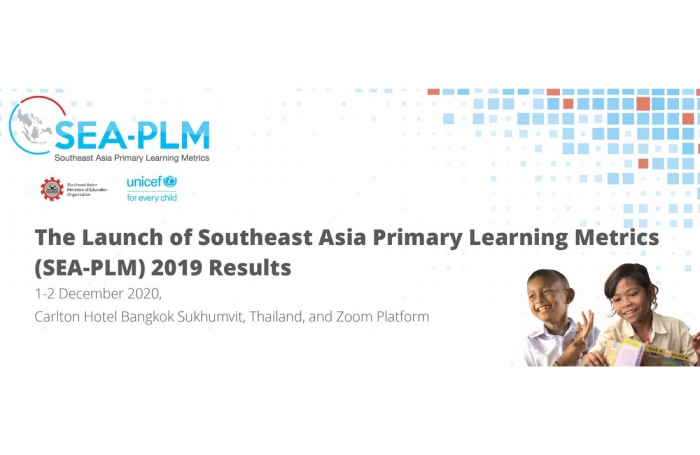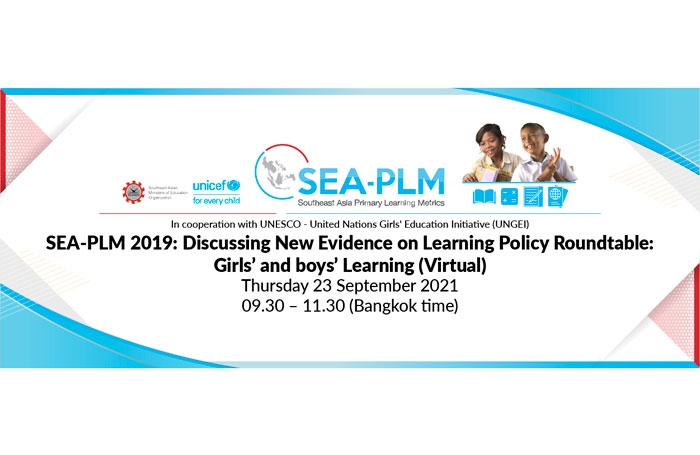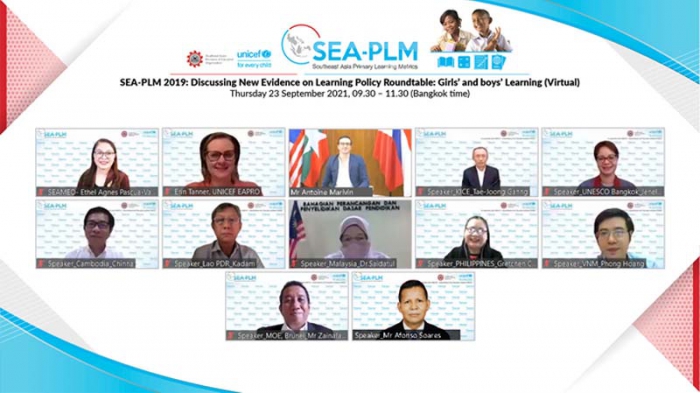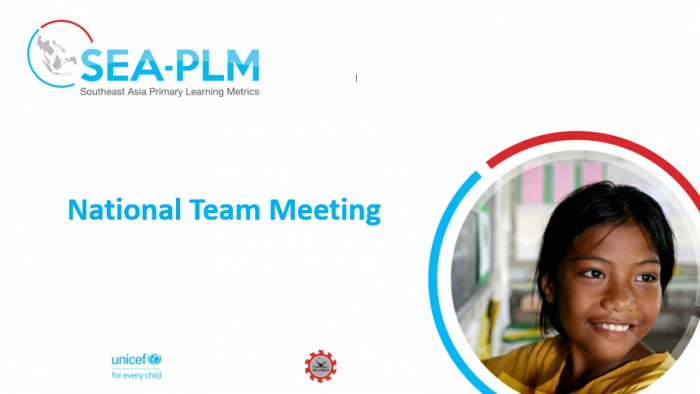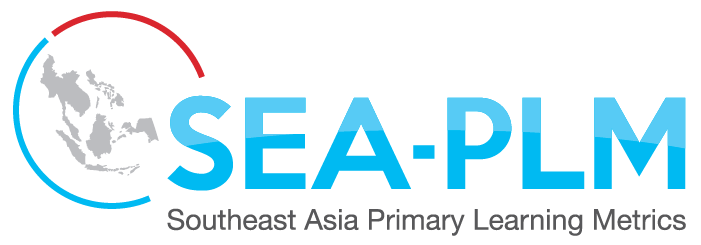
NEWS
This is your main NEWS category. Note that Joomla has another NEWS category built in. This one is for the plug-in called K2.
SEA-PLM 2019: Discussing New Evidence on Learning Policy Roundtable: Low Performing Readers (Virtual)
The SEA-PLM Secretariat co-managed by UNICEF Regional Office for East Asia and Pacific (UNICEF EAPRO) and the Southeast Asian Ministers of Education Organization (SEAMEO) Secretariat will organize the webinar SEA-PLM 2019: Discussing New Evidence on Learning - Policy Roundtable: Low Performing Readers.
This discussion will bring together Southeast Asian countries and their partners to learn about new evidence from SEA-PLM 2019 as part of their participation in the SEA-PLM programme. The purpose of the discussion will be: a) to better understand the profiles of low-performing readers; b) to reflect on the policy implications with experts and; c) to exchange on country experiences around reducing the risk of students being left behind academically across basic education.
As part of the discussion, the SEA-PLM Secretariat will launch a new SEA-PLM 2019 regional secondary analysis report - SEA-PLM 2019 latest evidence in basic education: Low performing readers in 6 Southeast Asian countries.
Read more: https://www.seameo.org/Main_news/308
SEA-PLM 2019: Discussing new evidence on learning - Policy Roundtable: Low Performing Readers (Virtual)
Jolin Nguyen, Bangkok, Thailand
19 November 2021 – The Southeast Asia Primary Learning Metrics (SEA-PLM) Secretariat, co-chaired by Southeast Asian Ministers of Education Organization (SEAMEO) and UNICEF Regional Office for East Asia and Pacific (UNICEF EAPRO), has successfully organised a policy roundtable discussion on low performing readers in Southeast Asia across basic education.
The virtual policy roundtable has gathered 75 participants who are education officers, researchers, specialists from SEAMEO Member Countries, SEAMEO Regional Centres and Network, partner organisations including the ASEAN Secretariat, the Australian Department of Foreign Affairs, the Australian Council for Educational Research (ACER), Korean Educational Development Institute (KEDI), Korea Institute for Curriculum and Evaluation (KICE), UNESCO’s Asia and Pacific Regional Bureau for Education - The Network on Education Quality Monitoring in the Asia-Pacific (NEQMAP), UNICEF country offices and the UNICEF Headquarters in New York, the United States.
As part of the discussion, the SEA-PLM Secretariat launched the second SEA-PLM 2019 regional secondary analysis report - SEA-PLM 2019 latest evidence in basic education: Low performing readers in 6 Southeast Asian countries, which was presented by the Australian Council for Educational Research (ACER) who had played the key role in conducting the SEA-PLM database. Two distinguished experts from two partner organisations, namely Korean Educational Development Institute (KEDI) and the UNICEF Headquarters in New York, the United States, provided their insights on the findings from the Secondary Analysis, as well as shared some recommendations on how to boost system and practice changes for reducing the number of low performing readers over time.
The discussion highlighted the concrete reflections from six SEAMEO Member Countries, namely Brunei Darussalam, Cambodia, Lao PDR, Malaysia, Philippines, and Vietnam on their engagement in tackling the low-performing readers and learners during the COVID-19 pandemic as well as the policy implications in accordance with the new evidence from SEA-PLM 2019.
In addition, two esteemed experts from partner organisations, namely Korea Institute for Curriculum and Evaluation (KICE) and UNESCO’s Asia and Pacific Regional Bureau for Education - The Network on Education Quality Monitoring in the Asia-Pacific (NEQMAP), shared their experiences in supporting and promoting the low performing readers and recommended some actions to track reading policy changes and their impacts on learning outcomes.
The virtual policy roundtable extended our effort in using SEA-PLM 2019 results to address challenges to children’s learning and assessment systems development. By interpreting the SEA-PLM 2019’s data and bringing about substantial reflective issues, we hope that each country can develop preliminary policy messages to inform education policies on reducing the risk of students being left behind academically across basic education.
"Proceedings of the policy roundtable is available for view and downloading."
SEA-PLM 2019 latest evidence in basic education: Boys’ and girls’ learning in 6 Southeast Asian countries
SEA-PLM 2019 latest evidence in basic education: Boys’ and girls’ learning in 6 Southeast Asian countries
This publication is the first in a series of regional thematic studies initiated by the SEA-PLM Secretariat – SEA-PLM 2019 latest evidence in basic education.
This paper delves deeper into the SEA-PLM 2019 database to examine learning and context disparities between boys and girls, and their differential effects in the 6 Southeast Asian participating countries.
The main findings can contribute to ongoing discussions and efforts in Southeast Asian countries to address equity gaps in learning between boys and girls, and to improve the responsiveness of education to the learning needs of girls and boys.
This document has been published and is available for downloading
Appendix B: Statistical tables
Recommended Citation: UNICEF. (2021). SEA-PLM 2019 latest evidence in basic education: Boys’ and girls’ learning in 6 Southeast Asian countries. United Nations Children’s Fund (UNICEF)
SEA-PLM won Gold Award for the Best of UNICEF Research 2021
Jolin Nguyen, Bangkok, Thailand
1 December 2021 – The Southeast Asia Primary Learning Metrics (SEA-PLM) programme won the Gold Award of the 9th annual Best of UNICEF Research (BOUR) global competition, hosted by the UNICEF Office of Research Innocenti, Italy.
From over 80 submissions from UNICEF’s Country Offices, Regional Offices, Headquarters, and National Committees to share their best and most impactful examples of research conducted or commissioned, the UNICEF Office of Research Innocenti selected the best research with the highest potential for tangible impact on policies and programmes benefiting children and young people. The Best of UNICEF Research 2021 showcased 11 powerful studies from around the world grouped according to UNICEF's five strategic priorities, as well as those covering multiple goals. The SEA-PLM programme presented by the SEA-PLM Secretariat, co-chaired by UNICEF Regional Office for East Asia and Pacific (UNICEF EAPRO) and Southeast Asian Ministers of Education Organization (SEAMEO), Thailand, was granted with the Gold Medal Badge for the highest award, under Education - Goal Area 2: Every Child Learns.

Upon announcing the achievement of the SEA-PLM programme, Ms Henrietta H. Fore, UNICEF’s Executive Director, stated that “This ambitious, relevant, and timely project was commended for its rigorous quantitative methodology and in-depth data analysis based on a true co-creation approach involving governments from multiple countries. The study can be a powerful tool for improving children’s achievement in the region.”
On behalf of the SEA-PLM Secretariat, the co-chair, Mr Francisco Benavides, Education Advisor, UNICEF EAPRO, expressed great honour of receiving the award and extended the sincere appreciation to colleagues at UNICEF and the SEAMEO Secretariat, Ministers, experts, national team managers from 6 participating countries: Cambodia, Lao PDR, Malaysia, Myanmar, the Philippines and Vietnam, as well as partner organizations. He conveyed special gratitude to 29,000 students, teachers and families that were part of the research to present all Grade 5 students in participating countries.
The SEA-PLM programme aims to be a tool that will bring real change in learning policies and to build a regional community of practices with national stakeholders working to advance children’s learning in each country. The research is part of a broader and ambitious programme to improve learning. Mr Francisco stated that the SEA-PLM 2024 would be conducted to reflect the impact of COVID-19 on learning and the recovery from learning loss, not only in cognitive and academic terms but also in social, emotional skills and children’s wellbeing, as well as to analyse how effective we had been to protect the learning of our children. The Gold Award for the Best of UNICEF Research 2021 has given tremendous support to the journey of the SEA-PLM programme in its effort to improve the primary education quality in Southeast Asia, especially in the shadow of the COVID-19 pandemic.
The award event can be watched on YouTube at: https://youtu.be/QbRKCJAkcXc
More information of the award and the winning papers can be found at: https://www.unicef-irc.org/bour2021

SEA-PLM 2019 latest evidence in basic education: Low-performing readers in 6 Southeast Asian countries
SEA-PLM 2019 latest evidence in basic education: Low-performing readers in 6 Southeast Asian countries
This publication is the second in a series of regional thematic studies initiated by the SEA-PLM Secretariat – SEA-PLM 2019 latest evidence in basic education.
This paper profiles children who are considered to be low reading performers in their respective countries, analyses what these children can do and explains how they are distributed throughout the region. It then explores how systems and schools support low-performing children based on SEA-PLM data.
This paper looks at potential solutions by investigating the characteristics of children who demonstrate academic resilience – that is, being able to perform well despite coming from a disadvantaged background. The findings from the study contribute to policy recommendations for how low-performing children can be better supported to reduce the risk of students being left behind academically across basic education.
This document has been published and is available for downloading
Appendix B: Reading proficiency scale, statistical tables and model characteristics
Appendix C: SPSS and Mplus syntax
Recommended Citation: UNICEF. (2021). SEA-PLM 2019 latest evidence in basic education: Low-performing readers in 6 Southeast Asian countries. United Nations Children’s Fund (UNICEF)
The 12th Regional Steering Committee marks the official introduction of the next round – SEA-PLM 2024
Jolin Nguyen, Bangkok, Thailand
26 – 28 January 2022 – The Southeast Asia Primary Learning Metrics (SEA-PLM) Secretariat, co-chaired by the Southeast Asian Ministers of Education Organization (SEAMEO) Secretariat and UNICEF Regional Office for East Asia and Pacific (UNICEF EAPRO), has successfully organised the 12th SEA-PLM Regional Steering Committee meeting virtually. The meeting was attended by 70 participants who were representatives from 6 SEA-PLM 2019 countries: Cambodia, Lao PDR, Malaysia, Myanmar, Philippines, Vietnam, together with other SEAMEO Member countries: Brunei Darussalam, Singapore, Thailand, Technical Advisory Group (TAG), and partner organisations including the ASEAN Secretariat, the ASEAN-Republic of Korea Programme Management Team, Korean Educational Development Institute (KEDI), Korea Institute for Curriculum and Evaluation (KICE), Mott Macdonald, University of Bath (the United Kingdom) and UNICEF country offices.
Marking the closing of the first round of assessment - SEA-PLM 2019 - and the official introduction of the second round of assessment - SEA-PLM 2024, the meeting was significant for shaping the future of SEA-PLM in several ways. Primarily, it provided an opportune platform for the key stakeholders and the SEA-PLM Secretariat to drive the directions of the SEA-PLM programme, especially in consideration of the grant to the SEA-PLM programme from the ASEAN-Republic of Korea Cooperation Fund (AKCF) through the ASEAN Secretariat.
The meeting focused on presenting and endorsing the new long-term SEA-PLM five-year strategic plan (2021-2025). It stimulated discussions on many important topics such as technical preparation, funding, partnership, challenges, and opportunities for the next SEA-PLM assessment round. As part of the meeting, bilateral discussions with countries, partners, and the SEA-PLM Secretariat were conducted to ensure regional consensus on programme planning, resources mobilisation, technical activities, and country modalities of participation. Furthermore, the long-term principles of the SEA-PLM programme were also discussed and featured via the external evaluation from Cambridge Education/ Mott Macdonald in terms of Relevance, Efficiency, Likely Impact, Sustainability, Equity, and Gender Equality.
As co-chair of the SEA-PLM Secretariat, Dr Ethel Agnes Pascua -Valenzuela, Director, SEAMEO Secretariat, articulated that the SEA-PLM roadmap and multi-sectoral partnership from the region would be welcome to pave the way towards a more inclusive and better quality of education for all children. In addition, Mr Francisco Benavides, Education Advisor, UNICEF EAPRO, co-chair of the SEA-PLM Secretariat, highlighted the need for an authentic partnership between and among countries to ensure the success of SEA-PLM 2024. Mr Benavides reaffirmed the commitment of UNICEF EAPRO to co-chair the regional SEA-PLM Secretariat and to continue the technical leadership and technical assistance to the SEA-PLM Strategic plan and goals.
SEA-PLM 2019: Discussing New Evidence on Learning Policy Roundtable: Supporting teachers to improve learning (Virtual)
The SEA-PLM Secretariat co-managed by UNICEF Regional Office for East Asia and Pacific (UNICEF EAPRO) and the Southeast Asian Ministers of Education Organization (SEAMEO) Secretariat will organize the webinar SEA-PLM 2019: Discussing New Evidence on Learning - Policy Roundtable: Supporting teachers to improve learning (Virtual) on Thursday 24 March 2022, 9:30 – 11:50 hrs. (Bangkok time, GMT +7).
The discussion will bring together Southeast Asian countries and their partners to reflect on new evidence from SEA-PLM 2019 and ongoing national policies and plan for supporting teacher workforce in basic education.
The SEA-PLM Secretariat will launch a new regional secondary analysis report - SEA-PLM 2019 latest evidence in basic education: Supporting teachers to improve learning in 6 Southeast Asian countries.
Read more: https://www.seameo.org/Main_news/330
SEA-PLM Upcoming Regional Activities
- 11th Regional Steering Committee – 17-18 September 2020, Online
For pre-launching SEA-PLM 2019 results and exchanging the SEA-PLM Programme short and long-term activities and opportunities. At distance consultation meeting may be organised earlier in the year for confirming SEA-PLM 2019 products and strategies on preparing the next round of assessment in 2023.
- A Bilateral Meeting with MOEs on SEA-PLM Preliminary Results – 15 October-15 November 2020, Online
For informing progress on data analysis and provide preliminary results to the Ministers of Education with the aims to receive guidance on policy implications and national supports on SEA-PLM activities at the national level.
- Launch of SEA-PLM 2019 Regional Report – 1 December 2020, Bangkok and online
For publicly releasing initial SEA-PLM 2019 regional products and results at the regional level with the objectives to promote better learning policies and practices.
SEA-PLM 2019 Main Regional Report, Children’s learning in 6 Southeast Asian countries
SEA-PLM 2019 Main Regional Report, Children’s learning in 6 Southeast Asian countries
SEA-PLM Secretariat is honoured to present SEA-PLM 2019 Main Regional Report, Children’s
learning in 6 Southeast Asian countries. Findings presented in the five chapters of the Report provide meaningful information to understand the level of resources, practices and learning outcomes in basic education across Southeast Asian countries.
Six countries from the region participated in SEA-PLM 2019: Cambodia, Lao PDR, Malaysia, Myanmar, Philippines and Viet Nam. This first round focused on Grade 5 students, and on 3 learning domains: reading, writing and mathematics. A global citizenship questionnaire module was also developed as an experimental exercise in comparative large-scale assessment at primary education level. In addition, SEA-PLM 2019 used a series of background questionnaires to collect extensive information about children, classrooms, schools, teachers, head teachers, parents and communities.
We hope this report and further national and regional research offers a new policy momentum among Southeast Asian countries and partners. This document has been published and is available for downloading
The summary of the document is also available for downloading
Recommended Citation: UNICEF & SEAMEO. (2020). SEA-PLM 2019 Main Regional Report, Children’s learning in 6 Southeast Asian countries. Bangkok, Thailand: United Nations Children’s Fund (UNICEF & Southeast Asian Ministers of Education Organization (SEAMEO) – SEA-PLM Secretariat.
The Official Launch of Southeast Asia Primary Learning Metrics (SEA-PLM) 2019 Results | 1-2 December 2020
Bangkok, Thailand: SEA-PLM Secretariat, co-chaired by United Nations Children’s Fund East Asia and Pacific Regional Office (UNICEF EAPRO) and Southeast Asian Ministers of Education Organization (SEAMEO), officially launched the Southeast Asia Primary Learning Metrics (SEA-PLM) 2019 results during 1 and 2 December 2020.
Read more : https://www.seameo.org/Main_news/255
Click here to download the Press Release.
Click here to download the SEA-PLM 2019 Main Regional Report: Children’s learning in 6 Southeast Asian countries.
Click here to download the Summary of SEA-PLM 2019 Main Regional Report: Children's learning in 6 Southeast Asian countries.
More...
SEA-PLM 2019: Discussing new evidence on learning Policy Roundtable: Girls’ and boys’ learning (Virtual)
The SEA-PLM Secretariat, co-chaired by UNICEF Regional Office for East Asia and Pacific (UNICEF EAPRO) and Southeast Asian Ministers of Education Organization (SEAMEO) Secretariat, in cooperation with UNESCO – United Nations Girls’ Education Initiative (UNGEI) organize a rich policy roundtable discussion on girls’ and boys’ learning in Southeast Asia across basic education. This discussion will bring together Southeast Asian countries as part of their participation and contribution to the SEA-PLM programme to learn about new evidence from SEA-PLM 2019 around the learning trends of girls and boys, reflect on the policy implications with experts and share and exchange on country experiences around improving equity in learning for girls and boys.
As part of discussion, the SEA-PLM Secretariat will launch the first SEA-PLM 2019 regional secondary analysis report - SEA-PLM 2019 latest evidence in basic education: Boys’ and girls’ learning in 6 Southeast Asian countries.
Read more : https://www.seameo.org/Main_programme/299
Click here to download the concept note.
SEA-PLM 2019: Discussing new evidence on learning - Policy Roundtable: Girls’ and boys’ learning (Virtual)
Jolin Nguyen, Bangkok, Thailand
23 September 2021 – The Southeast Asia Primary Learning Metrics (SEA-PLM) Secretariat, co-chaired by Southeast Asian Ministers of Education Organization (SEAMEO) and UNICEF Regional Office for East Asia and Pacific (UNICEF EAPRO), in cooperation with the United Nations Girls’ Education Initiative (UNGEI) has successfully organized a policy roundtable discussion on girls’ and boys’ learning in Southeast Asia across basic education.
The virtual policy roundtable has gathered 70 participants who are education officers, researchers, specialists from SEAMEO Member countries, SEAMEO Centres, partner organizations including Korea Institute for Curriculum and Evaluation (KICE), United Nations Girls’ Education Initiative (UNGEI), UNICEF country offices, UNESCO Asia-Pacific Regional Bureau for Education and Aide et Action International, Cambodia.
As part of the discussion, the SEA-PLM Secretariat launched the first SEA-PLM 2019 regional secondary analysis report - SEA-PLM 2019 latest evidence in basic education: Boys’ and girls’ learning in 6 Southeast Asian countries with the overview presented by SEA-PLM Secretariat. Two distinguished experts from two partner organizations, namely Korea Institute for Curriculum and Evaluation (KICE) and United Nations Girls’ Education Initiative (UNGEI) have provided and shared their insights on the findings from the Secondary Analysis.
The discussion highlighted the concrete reflections from five SEA-PLM participating countries, namely Cambodia, Lao PDR, Malaysia, Philippines, and Vietnam on the learning trends of girls and boys as well as the policy implications in accordance with the new evidence from SEA-PLM 2019. In addition, two SEAMEO member countries that did not yet join SEA-PLM 2019, namely Brunei Darussalam and Timor-Leste, shared country experiences in developing gender policies and improving equity in learning for girls and boys.
The virtual policy roundtable extended our effort in using SEA-PLM 2019 results for paving the way towards a more inclusive and better quality of education for all children in Southeast Asia. By providing insightful and comprehensive findings for developing evidence-based policy, we ensure that each country can actively develop, implement, monitor, report, and enhance the quality of learning at the national level as well as the regional level.
"Proceedings of the policy roundtable is available for view and downloading."
The first SEA-PLM 2019 regional secondary analysis report - SEA-PLM 2019 latest evidence in basic education: Boys’ and girls’ learning in 6 Southeast Asian countries is available for downloading.
SEA-PLM Technical Webinar on Proficiency Scales and Database and Regional Team Meeting on SEA-PLM Activities and Reporting
Due to travel restrictions during the pandemic, SEA-PLM Secretariat changed the format of an annual national team regional workshop from a five-day in-person training to a three-day technical webinar and a one-day regional online meeting. The Technical Webinar on Proficiency Scales and Database was organised during 4-6 August 2020. The Regional Meeting on SEA-PLM Activities and Reporting was organised virtually on 7 August 2020.
As part of the efforts of SEA-PLM Secretariat to increase the capacity of national teams, the webinar and meeting were organised in collaboration with the Australian Council for Educational Research (ACER) to:
- Report the process by which the regional scaling parameters and described proficiency scales have been developed;
- Increase an understanding of SEA-PLM national teams on managing and using the datasets, including the use of weighting, and the calculation and meaning of standard errors when computing results tables; and
- Inform all SEA-PLM national teams on the regional and national preparations for reporting and disseminating regional results.
The webinar and meeting were well-attended by all six SEA-PLM national teams. After the meeting, SEA-PLM Secretariat will actively progress in preparing the regional report. SEA-PLM national teams will be regularly updated and consulted for reviewing and validating the structure and the contents of the regional report.
SEA-PLM National Team Meeting
Despite the emergence of COVID-19 pandemic and its implications for implementing SEA-PLM activities, the SEA-PLM Secretariat continues to actively progress according to its agreed masterplan by adapting its implementation to the new normal approach.
In SEA-PLM planning at the regional level, we hereby reaffirm our commitment to implementing all scheduled activities, particularly the public release of SEA-PLM 2019 results at the official launch of the SEA-PLM regional report on 1 December 2020. To ensure concurrent progress at the national level towards this important goal, SEA-PLM Secretariat scheduled a conference call with each national team in July 2020. UNICEF country office representatives were invited to join the call to encourage supportive collaboration between the national team and its local partner.
The call was successfully organised to update all national teams on the main regional activities, protocols and embargo rules. Based on the responses to National Planning Guide 2020 survey submitted in March 2020, each national team updated the SEA-PLM Secretariat on a tentative national plan for reporting and disseminating national results at the national level after the completion of 1st SEA-PLM regional report launch on 1 December 2020.
